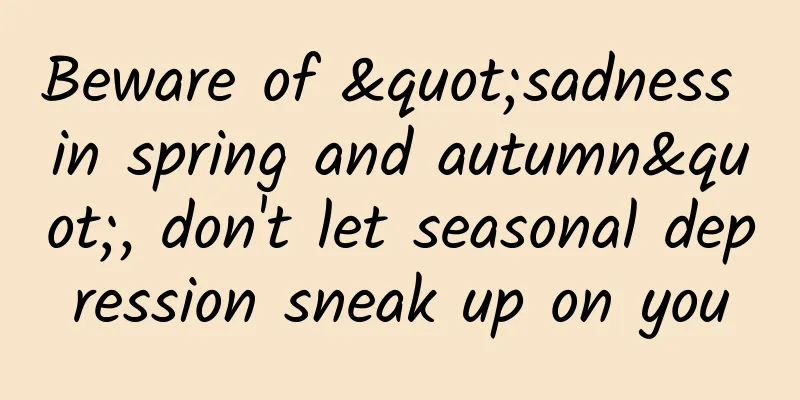Beware of "sadness in spring and autumn", don't let seasonal depression sneak up on you

|
Since entering autumn and winter, the temperature has been like a roller coaster. In early November, many places in the north still had high temperatures above 30 degrees, and then the temperature dropped to below zero within 20 days. The mood of many people has also become uncertain with the temperature: some people may feel inexplicably sad just by looking at the yellow leaves outside the window; some people can't wake up and have no energy every day. Not only do they feel tired and boring at work, but they also lose interest in going out to play. If these feelings persist, you need to be alert to whether "autumn sadness syndrome" has quietly found you. Autumn and winter have always been the peak seasons for "emotional illnesses" such as depression. Emotional problems caused by seasonal changes are often referred to as "autumn sadness syndrome." According to public media reports, the number of patients visiting the psychiatric department of Beijing Huilongguan Hospital has increased by about 20% in the two months since the beginning of autumn this year. " Sad autumn " hides the risk of depression, two major causes need attention Experts believe that the existence of "autumn sadness" may be attributed to biological and social factors. First, as the daylight hours become shorter and the night hours become longer in autumn and winter, the body's biological rhythms and neurotransmitters are prone to change or even disorder. For example, the pineal gland in the brain will secrete more melatonin, reducing brain activity and affecting the body's response ability. This environmental change will also affect the balance of neurotransmitter levels such as serotonin and dopamine in the human body, making people more sentimental, less interested in the things around them, and experiencing memory loss and difficulty concentrating. This physiological factor is closely related to the pathogenesis of depression. The generally accepted monoamine hypothesis holds that the decrease in the activity of the three neurotransmitter channels of 5-hydroxytryptamine (5-HT), norepinephrine (NE) and dopamine (DA) leads to the occurrence of depression. Among them, 5-hydroxytryptamine (5-HT) plays a major role in improving depression and mood, norepinephrine (NE) improves the sensitivity of patients' thinking and activities, and dopamine (DA) promotes patients' cognition, pleasure and interest. Once these neurotransmitters are out of balance, depression will follow. Secondly, "Autumn Sadness Syndrome" also has social reasons. Some experts pointed out that in the past farming era, people followed the principle of "spring growth, summer growth, autumn harvest, and winter storage". With the reduction of agricultural production activities, the human body's biological clock has also entered a state of "rest and recuperation". Nowadays, most people still face high-intensity work and fast-paced life after entering autumn and winter, and even have greater performance pressure at the end of the year. Although it does not conform to the biological laws from ancient times to the present, they can only "punch in to work" forcibly, which will also cause people to feel uncomfortable in autumn and winter, and feel negative, tired and depressed for no reason. Therefore, when the seasons change, especially in autumn and winter, we need to pay more attention to our physical and mental changes, plan our work and life reasonably, and adjust our state and emotions. Transient mood vs depression , need professional help Data shows that at least 15% of ordinary people experience depression in autumn; up to 38% of patients with depression will have an attack in autumn and winter. However, due to the existence of traditional concepts such as "spring sleepiness, autumn fatigue, summer naps, and winter sleepiness", people are more accepting of depression symptoms such as decreased interest, lack of energy, and reduced activity in autumn and winter. Many patients with depression and their families tend to ignore the occurrence of the disease. Experts remind that it is normal to have "autumn sadness" and there is no need to be overly nervous, but it should be taken seriously. In addition, patients with depression who have been cured have a higher risk of relapse in autumn and winter. Xiaolin was once a patient with depression. After systematic treatment, he recovered and resumed normal work and life. He once became the company's "gold medal sales" and got along well with colleagues and friends. But with the arrival of autumn and winter, he fell into the quagmire of emotions again: sleepiness, lack of energy, overeating; the pressure of performance at the end of the year was great, but he had no motivation to work, and the previous work achievements seemed meaningless; he was anxious and irritable for no reason, and fell into self-doubt. Experts pointed out that Xiaolin's performance is typical of many depression patients. "Autumn sadness" may just be a normal depression that everyone may experience, but if this mood lasts for more than 2 weeks and even affects normal life and work, you need to consider the possibility of depression. Don't lower your vigilance against seasonal depression because of seasonal factors and traditional concepts. Only through professional evaluation and diagnosis can you accurately determine whether it is depression or depression, so as to obtain appropriate treatment and support. How to get rid of the trouble of " sad autumn " , experts give advice Experts emphasize that in the face of negative emotions in autumn and winter, we should adjust our lives and states and actively adapt to the changes in autumn and winter. First, we should insist on exercising, increase the time of outdoor activities, insist on 15 to 30 minutes of physical exercise every day, and get more sun to promote metabolism. Second, in terms of diet, we should supplement more vitamin D and protein-rich foods. Third, we should timely vent negative emotions, relieve emotions by listening to music, watching movies, etc., or divert attention by gathering with friends, etc., or we can actively talk to relatives and friends or professional psychological counselors and seek help. If you are diagnosed with depression, you don't need to worry too much. Experts remind you that depression can be prevented and treated, and many patients can benefit from medication and psychotherapy. If you find that you may have depression problems, you should go to a regular hospital for help in time and follow the doctor's medication recommendations. Adhering to standardized treatment can effectively control symptoms and reduce the risk of recurrence. In terms of drug selection, since depression is related to the three major neurotransmitters 5-HT, NE, and DA, the current mainstream antidepressants all focus on the regulation of neurotransmitters. However, most antidepressants are only effective for 5-HT and NE, but have less intervention on DA. Since the three major neurotransmitters cannot be fully taken into account, many patients still have residual symptoms such as decreased cognitive function and anhedonia after taking the medicine, and are also deeply troubled by adverse reactions such as weight gain and sexual dysfunction. Especially in patients with depression in autumn and winter, most of them have symptoms such as lack of motivation and anhedonia, which are often related to the "happy hormone" - DA. With the launch and clinical application of the first innovative Class 1 chemical drug for the treatment of depression, torudivenlafaxine hydrochloride sustained-release tablets (Ruoxinlin), the majority of patients with depression can receive more comprehensive and standardized treatment. Preclinical studies have shown that Ruoxinlin has a reuptake inhibitory effect on 5-HT, NE and DA. Clinical research results have confirmed that Ruoxinlin can comprehensively and stably treat depression, significantly improve patients' anxiety, blockade/fatigue symptoms, anhedonia and cognitive ability; it has good safety and tolerability, does not cause drowsiness, and does not affect body weight and lipid metabolism, providing a new option for antidepressant treatment. Experts call for full-course treatment of depression, which has a prolonged course and a high relapse rate, and antidepressants are particularly important in the treatment of moderate to severe depression. Patients should establish a scientific and reasonable concept of medication, and get rid of the misconceptions of medication such as worrying about drug dependence and that all drugs are toxic; in clinical treatment, drugs with comprehensive efficacy and few side effects can greatly improve treatment compliance and confidence, helping patients to embrace life more actively and proactively, meet challenges, and smoothly return to normal life. |
<<: Does running a marathon hurt your knees? Can anyone run a marathon?
Recommend
Can I breastfeed if I have urticaria?
The occurrence of urticaria is not determined. It...
Can I get pregnant if the ovulation test is negative?
Nowadays, using ovulation test strips to test pre...
Bleeding after abortion
Bleeding after an abortion is a normal phenomenon...
What should pregnant women do if they eat ginkgo?
The food eaten by pregnant women needs to be scre...
Autumn is the peak season for bone diseases. Have you received the signal? You must read this maintenance manual!
1. What bone diseases should be prevented in autu...
The size of the follicle on the eighth day of ovulation induction
Before women choose to have in vitro fertilizatio...
I feel a little pain when my nipples are pinched
Women must take care of their breasts on a regula...
What causes early menopause?
Women generally enter menopause around the age of...
What to do if you have vaginal bleeding at 40 days of pregnancy
When every woman knows that she is pregnant, it i...
Why do girls have stomach pain after having sex?
A harmonious sex life can enhance the affection b...
How to maintain a woman's uterus
Women's health has become a topic that has re...
Stay away from malnutrition, cancer patients also need to manage their lives well every day
Author: Wang Qiong, Fudan University Cancer Hospi...
Obese woman pictures
In addition to the common risks of obesity, obesi...
Is it dangerous for people with scar constitution to have a second child?
People may encounter some diseases in their daily...
Should I massage the lumps in my breasts after weaning?
Weaning is a process that every mother will go th...









